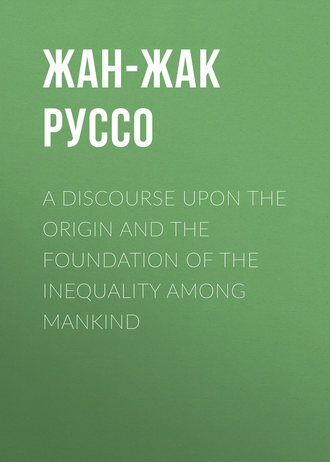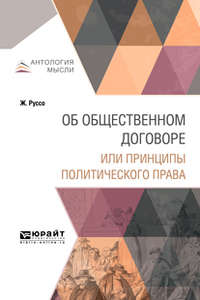 полная версия
полная версияA Discourse Upon the Origin and the Foundation of the Inequality Among Mankind
Alone, idle, and always surrounded with danger, savage man must be fond of sleep, and sleep lightly like other animals, who think but little, and may, in a manner, be said to sleep all the time they do not think: self-preservation being almost his only concern, he must exercise those faculties most, which are most serviceable in attacking and in defending, whether to subdue his prey, or to prevent his becoming that of other animals: those organs, on the contrary, which softness and sensuality can alone improve, must remain in a state of rudeness, utterly incompatible with all manner of delicacy; and as his senses are divided on this point, his touch and his taste must be extremely coarse and blunt; his sight, his hearing, and his smelling equally subtle: such is the animal state in general, and accordingly if we may believe travellers, it is that of most savage nations. We must not therefore be surprised, that the Hottentots of the Cape of Good Hope, distinguish with their naked eyes ships on the ocean, at as great a distance as the Dutch can discern them with their glasses; nor that the savages of America should have tracked the Spaniards with their noses, to as great a degree of exactness, as the best dogs could have done; nor that all these barbarous nations support nakedness without pain, use such large quantities of Piemento to give their food a relish, and drink like water the strongest liquors of Europe.
As yet I have considered man merely in his physical capacity; let us now endeavour to examine him in a metaphysical and moral light.
I can discover nothing in any mere animal but an ingenious machine, to which nature has given senses to wind itself up, and guard, to a certain degree, against everything that might destroy or disorder it. I perceive the very same things in the human machine, with this difference, that nature alone operates in all the operations of the beast, whereas man, as a free agent, has a share in his. One chooses by instinct; the other by an act of liberty; for which reason the beast cannot deviate from the rules that have been prescribed to it, even in cases where such deviation might be useful, and man often deviates from the rules laid down for him to his prejudice. Thus a pigeon would starve near a dish of the best flesh-meat, and a cat on a heap of fruit or corn, though both might very well support life with the food which they thus disdain, did they but bethink themselves to make a trial of it: it is in this manner dissolute men run into excesses, which bring on fevers and death itself; because the mind depraves the senses, and when nature ceases to speak, the will still continues to dictate.
All animals must be allowed to have ideas, since all animals have senses; they even combine their ideas to a certain degree, and, in this respect, it is only the difference of such degree, that constitutes the difference between man and beast: some philosophers have even advanced, that there is a greater difference between some men and some others, than between some men and some beasts; it is not therefore so much the understanding that constitutes, among animals, the specifical distinction of man, as his quality of a free agent. Nature speaks to all animals, and beasts obey her voice. Man feels the same impression, but he at the same time perceives that he is free to resist or to acquiesce; and it is in the consciousness of this liberty, that the spirituality of his soul chiefly appears: for natural philosophy explains, in some measure, the mechanism of the senses and the formation of ideas; but in the power of willing, or rather of choosing, and in the consciousness of this power, nothing can be discovered but acts, that are purely spiritual, and cannot be accounted for by the laws of mechanics.
But though the difficulties, in which all these questions are involved, should leave some room to dispute on this difference between man and beast, there is another very specific quality that distinguishes them, and a quality which will admit of no dispute; this is the faculty of improvement; a faculty which, as circumstances offer, successively unfolds all the other faculties, and resides among us not only in the species, but in the individuals that compose it; whereas a beast is, at the end of some months, all he ever will be during the rest of his life; and his species, at the end of a thousand years, precisely what it was the first year of that long period. Why is man alone subject to dotage? Is it not, because he thus returns to his primitive condition? And because, while the beast, which has acquired nothing and has likewise nothing to lose, continues always in possession of his instinct, man, losing by old age, or by accident, all the acquisitions he had made in consequence of his perfectibility, thus falls back even lower than beasts themselves? It would be a melancholy necessity for us to be obliged to allow, that this distinctive and almost unlimited faculty is the source of all man's misfortunes; that it is this faculty, which, though by slow degrees, draws them out of their original condition, in which his days would slide away insensibly in peace and innocence; that it is this faculty, which, in a succession of ages, produces his discoveries and mistakes, his virtues and his vices, and, at long run, renders him both his own and nature's tyrant. It would be shocking to be obliged to commend, as a beneficent being, whoever he was that first suggested to the Oronoco Indians the use of those boards which they bind on the temples of their children, and which secure to them the enjoyment of some part at least of their natural imbecility and happiness.
Savage man, abandoned by nature to pure instinct, or rather indemnified for that which has perhaps been denied to him by faculties capable of immediately supplying the place of it, and of raising him afterwards a great deal higher, would therefore begin with functions that were merely animal: to see and to feel would be his first condition, which he would enjoy in common with other animals. To will and not to will, to wish and to fear, would be the first, and in a manner, the only operations of his soul, till new circumstances occasioned new developments.
Let moralists say what they will, the human understanding is greatly indebted to the passions, which, on their side, are likewise universally allowed to be greatly indebted to the human understanding. It is by the activity of our passions, that our reason improves: we covet knowledge merely because we covet enjoyment, and it is impossible to conceive why a man exempt from fears and desires should take the trouble to reason. The passions, in their turn, owe their origin to our wants, and their increase to our progress in science; for we cannot desire or fear anything, but in consequence of the ideas we have of it, or of the simple impulses of nature; and savage man, destitute of every species of knowledge, experiences no passions but those of this last kind; his desires never extend beyond his physical wants; he knows no goods but food, a female, and rest; he fears no evil but pain, and hunger; I say pain, and not death; for no animal, merely as such, will ever know what it is to die, and the knowledge of death, and of its terrors, is one of the first acquisitions made by man, in consequence of his deviating from the animal state.
I could easily, were it requisite, cite facts in support of this opinion, and show, that the progress of the mind has everywhere kept pace exactly with the wants, to which nature had left the inhabitants exposed, or to which circumstances had subjected them, and consequently to the passions, which inclined them to provide for these wants. I could exhibit in Egypt the arts starting up, and extending themselves with the inundations of the Nile; I could pursue them in their progress among the Greeks, where they were seen to bud forth, grow, and rise to the heavens, in the midst of the sands and rocks of Attica, without being able to take root on the fertile banks of the Eurotas; I would observe that, in general, the inhabitants of the north are more industrious than those of the south, because they can less do without industry; as if nature thus meant to make all things equal, by giving to the mind that fertility she has denied to the soil.
But exclusive of the uncertain testimonies of history, who does not perceive that everything seems to remove from savage man the temptation and the means of altering his condition? His imagination paints nothing to him; his heart asks nothing from him. His moderate wants are so easily supplied with what he everywhere finds ready to his hand, and he stands at such a distance from the degree of knowledge requisite to covet more, that he can neither have foresight nor curiosity. The spectacle of nature, by growing quite familiar to him, becomes at last equally indifferent. It is constantly the same order, constantly the same revolutions; he has not sense enough to feel surprise at the sight of the greatest wonders; and it is not in his mind we must look for that philosophy, which man must have to know how to observe once, what he has every day seen. His soul, which nothing disturbs, gives itself up entirely to the consciousness of its actual existence, without any thought of even the nearest futurity; and his projects, equally confined with his views, scarce extend to the end of the day. Such is, even at present, the degree of foresight in the Caribbean: he sells his cotton bed in the morning, and comes in the evening, with tears in his eyes, to buy it back, not having foreseen that he should want it again the next night.
The more we meditate on this subject, the wider does the distance between mere sensation and the most simple knowledge become in our eyes; and it is impossible to conceive how man, by his own powers alone, without the assistance of communication, and the spur of necessity, could have got over so great an interval. How many ages perhaps revolved, before men beheld any other fire but that of the heavens? How many different accidents must have concurred to make them acquainted with the most common uses of this element? How often have they let it go out, before they knew the art of reproducing it? And how often perhaps has not every one of these secrets perished with the discoverer? What shall we say of agriculture, an art which requires so much labour and foresight; which depends upon other arts; which, it is very evident, cannot be practised but in a society, if not a formed one, at least one of some standing, and which does not so much serve to draw aliments from the earth, for the earth would yield them without all that trouble, as to oblige her to produce those things, which we like best, preferably to others? But let us suppose that men had multiplied to such a degree, that the natural products of the earth no longer sufficed for their support; a supposition which, by the bye, would prove that this kind of life would be very advantageous to the human species; let us suppose that, without forge or anvil, the instruments of husbandry had dropped from the heavens into the hands of savages, that these men had got the better of that mortal aversion they all have for constant labour; that they had learned to foretell their wants at so great a distance of time; that they had guessed exactly how they were to break the earth, commit their seed to it, and plant trees; that they had found out the art of grinding their corn, and improving by fermentation the juice of their grapes; all operations which we must allow them to have learned from the gods, since we cannot conceive how they should make such discoveries of themselves; after all these fine presents, what man would be mad enough to cultivate a field, that may be robbed by the first comer, man or beast, who takes a fancy to the produce of it. And would any man consent to spend his day in labour and fatigue, when the rewards of his labour and fatigue became more and more precarious in proportion to his want of them? In a word, how could this situation engage men to cultivate the earth, as long as it was not parcelled out among them, that is, as long as a state of nature subsisted.
Though we should suppose savage man as well versed in the art of thinking, as philosophers make him; though we were, after them, to make him a philosopher himself, discovering of himself the sublimest truths, forming to himself, by the most abstract arguments, maxims of justice and reason drawn from the love of order in general, or from the known will of his Creator: in a word, though we were to suppose his mind as intelligent and enlightened, as it must, and is, in fact, found to be dull and stupid; what benefit would the species receive from all these metaphysical discoveries, which could not be communicated, but must perish with the individual who had made them? What progress could mankind make in the forests, scattered up and down among the other animals? And to what degree could men mutually improve and enlighten each other, when they had no fixed habitation, nor any need of each other's assistance; when the same persons scarcely met twice in their whole lives, and on meeting neither spoke to, or so much as knew each other?
Let us consider how many ideas we owe to the use of speech; how much grammar exercises, and facilitates the operations of the mind; let us, besides, reflect on the immense pains and time that the first invention of languages must have required: Let us add these reflections to the preceding; and then we may judge how many thousand ages must have been requisite to develop successively the operations, which the human mind is capable of producing.
I must now beg leave to stop one moment to consider the perplexities attending the origin of languages. I might here barely cite or repeat the researches made, in relation to this question, by the Abbe de Condillac, which all fully confirm my system, and perhaps even suggested to me the first idea of it. But, as the manner, in which the philosopher resolves the difficulties of his own starting, concerning the origin of arbitrary signs, shows that he supposes, what I doubt, namely a kind of society already established among the inventors of languages; I think it my duty, at the same time that I refer to his reflections, to give my own, in order to expose the same difficulties in a light suitable to my subject. The first that offers is how languages could become necessary; for as there was no correspondence between men, nor the least necessity for any, there is no conceiving the necessity of this invention, nor the possibility of it, if it was not indispensable. I might say, with many others, that languages are the fruit of the domestic intercourse between fathers, mothers, and children: but this, besides its not answering any difficulties, would be committing the same fault with those, who reasoning on the state of nature, transfer to it ideas collected in society, always consider families as living together under one roof, and their members as observing among themselves an union, equally intimate and permanent with that which we see exist in a civil state, where so many common interests conspire to unite them; whereas in this primitive state, as there were neither houses nor cabins, nor any kind of property, every one took up his lodging at random, and seldom continued above one night in the same place; males and females united without any premeditated design, as chance, occasion, or desire brought them together, nor had they any great occasion for language to make known their thoughts to each other. They parted with the same ease. The mother suckled her children, when just born, for her own sake; but afterwards out of love and affection to them, when habit and custom had made them dear to her; but they no sooner gained strength enough to run about in quest of food than they separated even from her of their own accord; and as they scarce had any other method of not losing each other, than that of remaining constantly in each other's sight, they soon came to such a pass of forgetfulness, as not even to know each other, when they happened to meet again. I must further observe that the child having all his wants to explain, and consequently more things to say to his mother, than the mother can have to say to him, it is he that must be at the chief expense of invention, and the language he makes use of must be in a great measure his own work; this makes the number of languages equal to that of the individuals who are to speak them; and this multiplicity of languages is further increased by their roving and vagabond kind of life, which allows no idiom time enough to acquire any consistency; for to say that the mother would have dictated to the child the words he must employ to ask her this thing and that, may well enough explain in what manner languages, already formed, are taught, but it does not show us in what manner they are first formed.
Let us suppose this first difficulty conquered: Let us for a moment consider ourselves at this side of the immense space, which must have separated the pure state of nature from that in which languages became necessary, and let us, after allowing such necessity, examine how languages could begin to be established. A new difficulty this, still more stubborn than the preceding; for if men stood in need of speech to learn to think, they must have stood in still greater need of the art of thinking to invent that of speaking; and though we could conceive how the sounds of the voice came to be taken for the conventional interpreters of our ideas we should not be the nearer knowing who could have been the interpreters of this convention for such ideas, as, in consequence of their not having any sensible objects, could not be made manifest by gesture or voice; so that we can scarce form any tolerable conjectures concerning the birth of this art of communicating our thoughts, and establishing a correspondence between minds: a sublime art which, though so remote from its origin, philosophers still behold at such a prodigious distance from its perfection, that I never met with one of them bold enough to affirm it would ever arrive there, though the revolutions necessarily produced by time were suspended in its favour; though prejudice could be banished from, or would be at least content to sit silent in the presence of our academies, and though these societies should consecrate themselves, entirely and during whole ages, to the study of this intricate object.
The first language of man, the most universal and most energetic of all languages, in short, the only language he had occasion for, before there was a necessity of persuading assembled multitudes, was the cry of nature. As this cry was never extorted but by a kind of instinct in the most urgent cases, to implore assistance in great danger, or relief in great sufferings, it was of little use in the common occurrences of life, where more moderate sentiments generally prevail. When the ideas of men began to extend and multiply, and a closer communication began to take place among them, they laboured to devise more numerous signs, and a more extensive language: they multiplied the inflections of the voice, and added to them gestures, which are, in their own nature, more expressive, and whose meaning depends less on any prior determination. They therefore expressed visible and movable objects by gestures and those which strike the ear, by imitative sounds: but as gestures scarcely indicate anything except objects that are actually present or can be easily described, and visible actions; as they are not of general use, since darkness or the interposition of an opaque medium renders them useless; and as besides they require attention rather than excite it: men at length bethought themselves of substituting for them the articulations of voice, which, without having the same relation to any determinate object, are, in quality of instituted signs, fitter to represent all our ideas; a substitution, which could only have been made by common consent, and in a manner pretty difficult to practise by men, whose rude organs were unimproved by exercise; a substitution, which is in itself more difficult to be conceived, since the motives to this unanimous agreement must have been somehow or another expressed, and speech therefore appears to have been exceedingly requisite to establish the use of speech.
We must allow that the words, first made use of by men, had in their minds a much more extensive signification, than those employed in languages of some standing, and that, considering how ignorant they were of the division of speech into its constituent parts; they at first gave every word the meaning of an entire proposition. When afterwards they began to perceive the difference between the subject and attribute, and between verb and noun, a distinction which required no mean effort of genius, the substantives for a time were only so many proper names, the infinitive was the only tense, and as to adjectives, great difficulties must have attended the development of the idea that represents them, since every adjective is an abstract word, and abstraction is an unnatural and very painful operation.
At first they gave every object a peculiar name, without any regard to its genus or species, things which these first institutors of language were in no condition to distinguish; and every individual presented itself solitary to their minds, as it stands in the table of nature. If they called one oak A, they called another oak B: so that their dictionary must have been more extensive in proportion as their knowledge of things was more confined. It could not but be a very difficult task to get rid of so diffuse and embarrassing a nomenclature; as in order to marshal the several beings under common and generic denominations, it was necessary to be first acquainted with their properties, and their differences; to be stocked with observations and definitions, that is to say, to understand natural history and metaphysics, advantages which the men of these times could not have enjoyed.
Besides, general ideas cannot be conveyed to the mind without the assistance of words, nor can the understanding seize them without the assistance of propositions. This is one of the reasons, why mere animals cannot form such ideas, nor ever acquire the perfectibility which depends on such an operation. When a monkey leaves without the least hesitation one nut for another, are we to think he has any general idea of that kind of fruit, and that he compares these two individual bodies with his archetype notion of them? No, certainly; but the sight of one of these nuts calls back to his memory the sensations which he has received from the other; and his eyes, modified after some certain manner, give notice to his palate of the modification it is in its turn going to receive. Every general idea is purely intellectual; let the imagination tamper ever so little with it, it immediately becomes a particular idea. Endeavour to represent to yourself the image of a tree in general, you never will be able to do it; in spite of all your efforts it will appear big or little, thin or tufted, of a bright or a deep colour; and were you master to see nothing in it, but what can be seen in every tree, such a picture would no longer resemble any tree. Beings perfectly abstract are perceivable in the same manner, or are only conceivable by the assistance of speech. The definition of a triangle can alone give you a just idea of that figure: the moment you form a triangle in your mind, it is this or that particular triangle and no other, and you cannot avoid giving breadth to its lines and colour to its area. We must therefore make use of propositions; we must therefore speak to have general ideas; for the moment the imagination stops, the mind must stop too, if not assisted by speech. If therefore the first inventors could give no names to any ideas but those they had already, it follows that the first substantives could never have been anything more than proper names.
But when by means, which I cannot conceive, our new grammarians began to extend their ideas, and generalize their words, the ignorance of the inventors must have confined this method to very narrow bounds; and as they had at first too much multiplied the names of individuals for want of being acquainted with the distinctions called genus and species, they afterwards made too few genera and species for want of having considered beings in all their differences; to push the divisions far enough, they must have had more knowledge and experience than we can allow them, and have made more researches and taken more pains, than we can suppose them willing to submit to. Now if, even at this present time, we every day discover new species, which had before escaped all our observations, how many species must have escaped the notice of men, who judged of things merely from their first appearances! As to the primitive classes and the most general notions, it were superfluous to add that these they must have likewise overlooked: how, for example, could they have thought of or understood the words, matter, spirit, substance, mode, figure, motion, since even our philosophers, who for so long a time have been constantly employing these terms, can themselves scarcely understand them, and since the ideas annexed to these words being purely metaphysical, no models of them could be found in nature?









